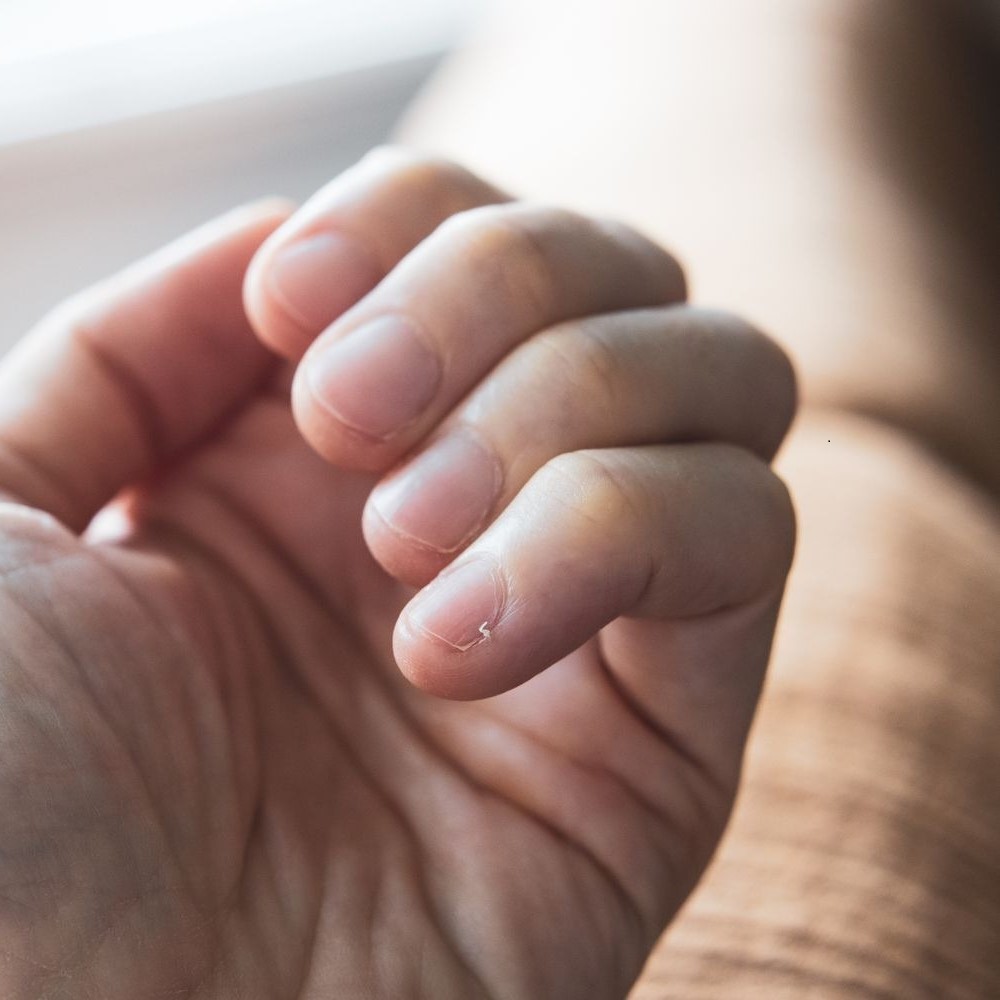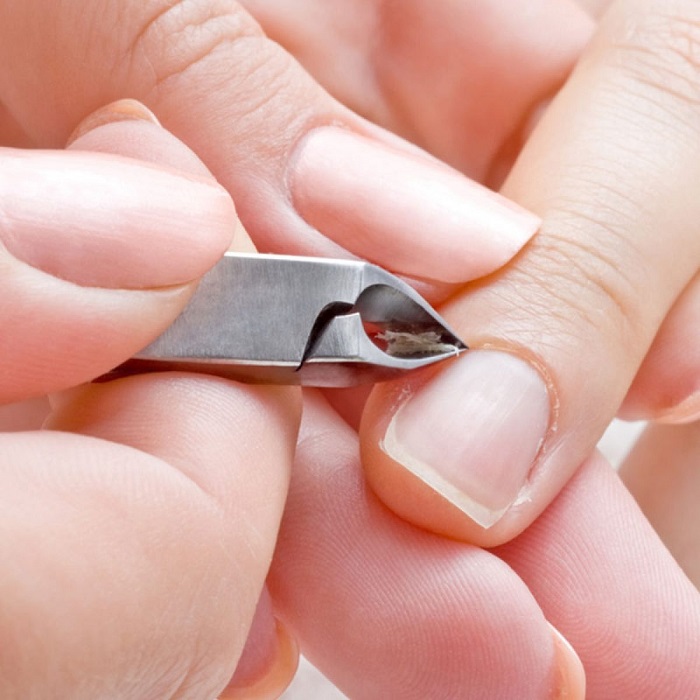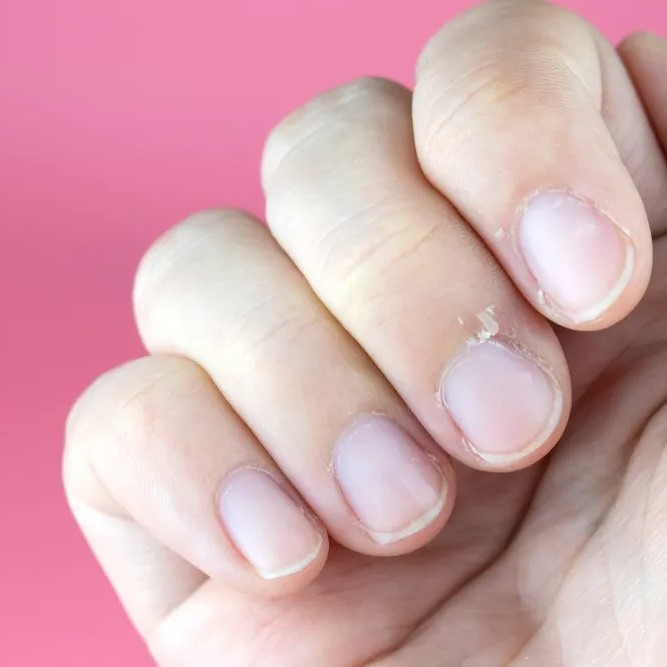What is a Hang Nail?
A hang nail is a small, torn piece of skin near the nail’s edge. It often occurs beside the nail, not on it. This pesky bit of skin can cause discomfort or even pain. Hang nails are not actually part of the nail itself, but rather, they are the result of skin splitting from the cuticle. They typically appear on fingers but can also affect toes. Ignoring hang nails can lead to further irritation or infections, especially if you pull or bite at them. Understanding what a hang nail is paves the way for proper nail care and prevention methods.
Common Causes of Hang Nails
Understanding the common causes of hang nails is crucial in taking proactive steps to prevent them. Here are some factors that can lead to the formation of hang nails:
Frequent Hand Washing
Excessive washing can strip natural oils from the skin, leading to dryness and cracks around the nails.
Harsh Weather Conditions
Cold and dry weather can dehydrate the skin. Without proper moisture, hang nails are more likely to form.
Nail-Biting Habit
Biting your nails damages the nail bed and cuticles, often resulting in hang nails.
Poor Manicuring Techniques
Cutting cuticles too closely or with unclean tools can cause hang nails to develop.
Use of Harsh Chemicals
Household cleaners and detergents can be tough on your hands, causing damage and hang nails.
Lack of Moisturization
Neglecting to regularly moisturize hands can leave the skin prone to splitting and hang nails.
By identifying these common causes of hang nails, you can modify your nail care routine to address these issues. Minimizing exposure to harsh chemicals, using moisturizers, wearing gloves during cold weather, and avoiding nail-biting can all contribute to healthier nails and fewer hang nails.
Daily Nail Care Practices to Prevent Hang Nails

Incorporating daily nail care into your routine is pivotal in preventing hang nails. Here are some effective practices:
Keep Nails Trimmed and Clean
Regularly trim your nails to avoid snags and tears. Keep them clean to prevent infection.
Use Gentle Soap
Choose mild soaps when washing hands. Harsh soaps can increase skin dryness and vulnerability.
Moisturize Regularly
Apply a quality hand cream after washing hands. It helps preserve skin moisture around nails.
Wear Gloves for Chores
Protect your hands with gloves when using cleaning agents or doing garden work. It shields skin from harsh substances.
Avoid Nail Biting
Stop biting your nails. It damages the cuticles and predisposes you to hang nails.
Take Care with Cuticles
Do not cut your cuticles. Gently push them back during manicure. Cutting risks skin damage and hang nails.
By following these simple tips, you can maintain healthy nails and reduce the risk of developing troubling hang nails. Adequate care is crucial in keeping your nails strong and your cuticles intact.
The Role of Nutrition in Nail Health
Maintaining a balanced diet plays a key part in nail health. Just like the rest of your body, your nails need a variety of nutrients to stay strong and avoid issues like hang nails. Here’s how proper nutrition aids in keeping your nails in top condition:
Consume Protein-rich Foods
Your nails mainly consist of a protein called keratin. Eating foods rich in protein supports nail growth and strength. Include eggs, poultry, beans, and nuts in your diet.
Incorporate Fatty Acids
Omega-3 fatty acids help keep your nails moisturized, reducing the chances of hang nails. Add fish, flaxseeds, and walnuts to your meals.
Up Your Iron Intake
Iron prevents brittle nails, which can lead to hang nails. Enjoy leafy greens and red meat to boost your iron levels.
Get Enough Vitamin C
Vitamin C is vital for collagen production, essential for nail integrity. Citrus fruits and strawberries are great sources.
Include Biotin in Your Diet
Biotin, a B vitamin, is often touted for its nail-strengthening properties. Avocado, sweet potatoes, and almonds are biotin-rich foods.
By eating a nutrient-rich diet, you are less likely to face nail issues, including hang nails. Remember, nutrition is a foundation of overall health and that certainly includes the health of your nails.
Professional Manicure Tips to Avoid Hang Nails
Visiting a professional for a manicure can offer more than just aesthetic benefits. It can also be a step towards preventing hang nails. To keep your nails looking great and hang nail-free, consider these professional manicure tips:
Choose a Reputable Salon
Select a salon with high cleanliness standards. A clean environment reduces the risk of infections.
Insist on Sterilized Tools
Make sure the manicurist uses sterilized equipment. This avoids transferring bacteria to your nails.
Opt for Gentle Cuticle Care
Request that they gently push back cuticles, not cut them. Cutting can lead to hang nails.
Ask about Nail Shapes
Consult your manicurist on the best nail shape to prevent snags and tears.
Avoid Harsh Chemicals
Seek salon products free from harsh chemicals. These can dry out skin and cause hang nails.
Request a Hydrating Treatment
A moisturizing treatment can reinforce your skin and prevent hang nail formation.
Schedule Regular Appointments
Maintaining a regular manicure schedule ensures nails remain in good condition.
By applying these tips from professionals, hang nails can be a thing of the past. You now have a manicure approach that promotes nail health and beauty simultaneously. Remember, prevention is the best way to manage hang nails. Take care of your nails with regular professional mani care and enjoy strong, healthy nails all year around.
Essential Vitamins and Minerals for Strong Nails

Strong nails are not just attractive; they are a sign of good health. To prevent hang nails, we must focus on the essentials: vitamins and minerals that support nail strength and integrity. Here’s a rundown of these key nutrients:
Vitamin A
Vitamin A aids in nail growth. Include carrots and sweet potatoes in your diet for this nutrient.
Vitamin C
This vitamin helps produce collagen, critical for nail health. Citrus fruits and berries are good sources.
Vitamin E
It keeps nail hydration in check, preventing dry, brittle nails. Nuts and seeds are rich in Vitamin E.
B Vitamins
Biotin, a B vitamin, is well-known for supporting nail strength. Eggs and avocados have biotin.
Iron
Iron deficiency can lead to brittle nails, which increase hang nail risks. Eat more spinach and meat.
Zinc
Zinc plays a part in nail growth and repair. Find zinc in pumpkin seeds and lentils.
Calcium
Calcium is vital for nail hardness. Dairy and leafy greens give you calcium.
Magnesium
Magnesium aids protein synthesis for nail growth. Look to almonds and black beans for this mineral.
Omega-3 Fatty Acids
These moisturize the nail bed, warding off hang nails. Seafood and flaxseeds are rich in omega-3s.
By integrating these nutrients into your diet, you can build a solid foundation for preventing hang nails and maintaining nail strength. Remember to consume these in adequate amounts and consider supplementing if needed, but always consult with a healthcare provider before starting any new supplement regimen.
How to Properly Trim Nails to Prevent Hang Nails
Preventing hang nails starts with proper nail trimming. Here’s how to do it right:
Use the Right Tools
Select a sharp nail clipper or scissors. Dull tools can cause nails to tear, leading to hang nails.
Clip Nails Straight Across
Cut nails straight across, not rounded. This prevents the corners from growing into the skin and causing problems.
Avoid Too Short Trimming
Don’t cut nails too short. Leave a small sliver of white at the tip to protect the nail bed.
File with Care
After clipping, gently smooth out rough edges with a nail file. Move in one direction to prevent splitting.
Trim Regularly
Regular maintenance is key. Trim nails every two weeks to keep them at a healthy length and avoid snags.
By following these steps, you can minimize the risk of hang nails and keep your nails strong and looking neat.
When to Seek Professional Help for Nail Problems

Knowing when to seek professional help for nail problems is as important as daily care in hang nail prevention. While most hang nails can be cared for at home, there are situations where medical advice is necessary. Here’s what to look out for:
Signs of Infection
If you notice redness, swelling, or pus around the nail area, it may be infected. An infection can arise from a hang nail and requires prompt treatment.
Persistent Pain
Nails that are consistently painful, despite proper care and hang nail prevention measures, should be examined by a professional.
Nail Changes
Changes in nail color, shape, or texture can signify underlying health issues. A doctor can help identify the cause.
Unsuccessful Home Treatments
When home remedies do not resolve your hang nail issues, a professional can offer alternative treatments.
Frequent Hang Nails
If you get hang nails often, even with correct trimming and care, seek advice. A specialist may pinpoint a specific cause.
By being attentive and knowing when to get professional help, you can ensure the health of your nails and avoid complications from hang nails. Remember, while prevention is key, do not hesitate to consult a doctor or dermatologist if your nail problems persist.